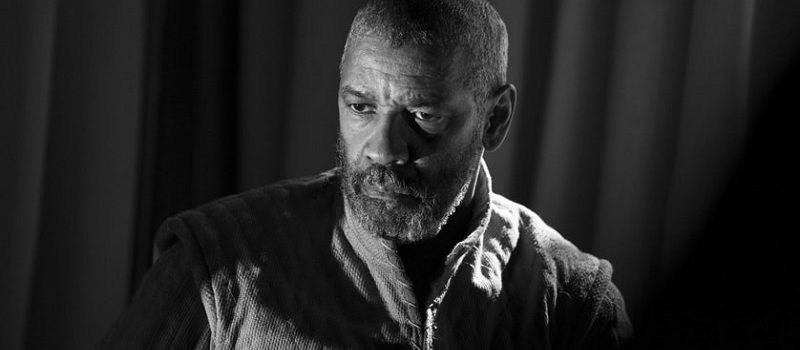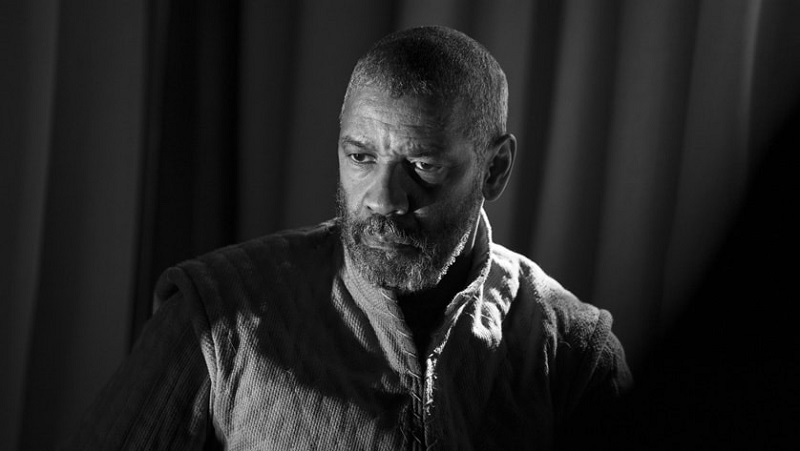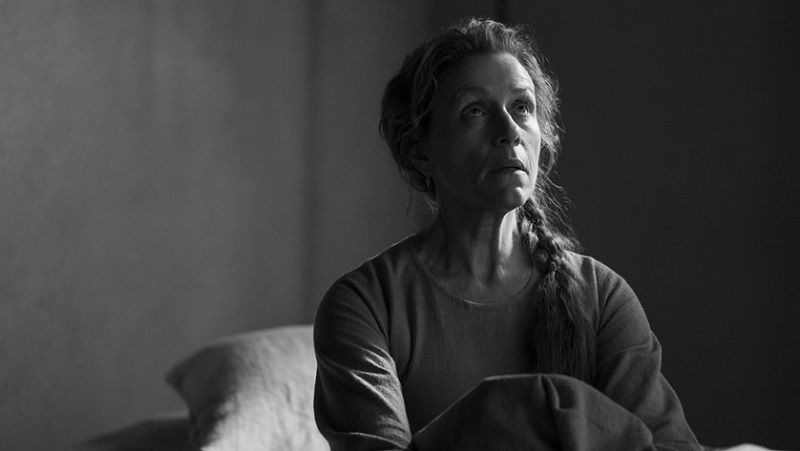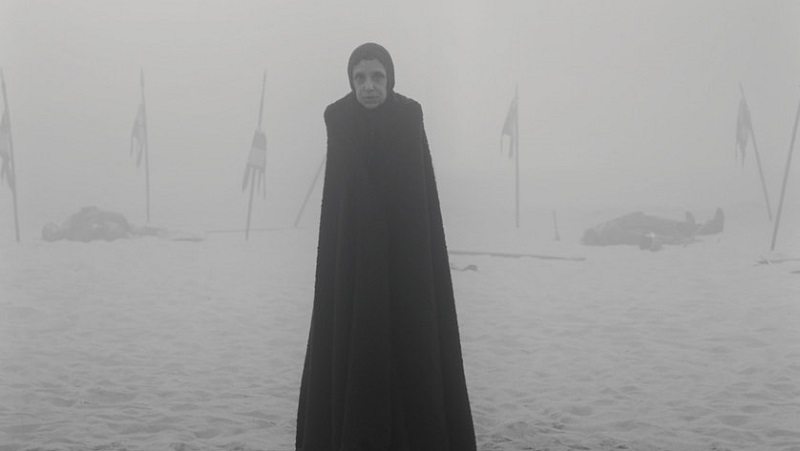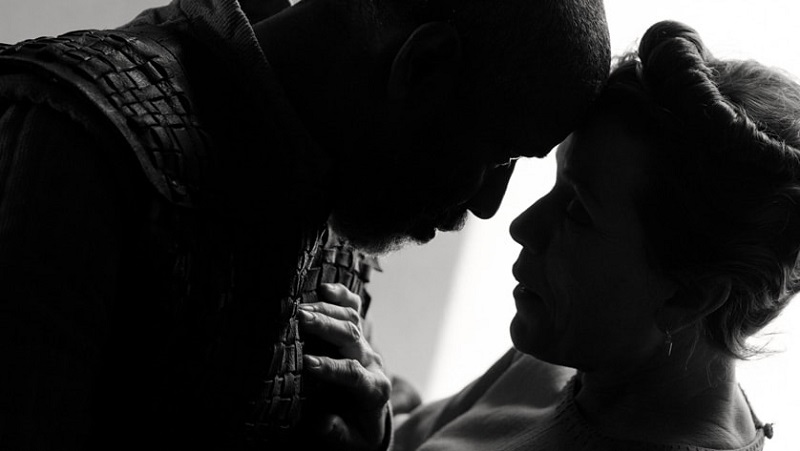One of the more psychologically complex of William Shakespeare’s masterworks, Macbeth, gets the Joel Coen treatment in AppleTV+’s stunning new work. The Tragedy of Macbeth stars a one-two punch of thespian brilliance with Denzel Washington as Macbeth and Frances McDormand delivering one of the cinema’s more memorable Lady Macbeth’s. Yes, that is saying something.
Between them, Washington and McDormand are a force of nature. Both should be locks for Oscar nods when those are announced in a few weeks. Each fuels the other’s fire in a way that reverberates throughout Coen’s film. The Tragedy of Macbeth is a supreme achievement in every facet of the filmmaking process. The black and white film does something extraordinary in that it presents a story that feels very staged and theatrical, all while being every ounce of the cinematic that one would expect from one of the Coen brothers.
As a critic, it is all-too-easy to compare power plays in fictional storytelling as Shakespearian because, frankly, The Bard was the best at crafting that kind of intrigue. Washington embodies the ultimate of those Shakespearian power-hungry souls that have molded character creation in this arena for half a millennium. His Macbeth is established early as having designs on the crown, and when he sees his opportunity to take that ornate ruling “device” one sees a light go off in the actor’s eyes like a lion ready to pounce on its prey. It happens so quickly, and viciously, it’s like Duncan (Brendan Gleeson) didn’t see it coming.
Washington exponentially rivets with each second that he is on the screen. Now, considering this is a deeply mental-centric turn as Macbeth, the Oscar winner had to dig someplace extra special. The actor has taken roles as characters who play in a similar ballpark as the titular one in Coen’s film. Besides jockeying the verbal Olympiad that is Shakespeare’s prose, there is the fact that any actor will tell you they sought to put their own unique stamp on a character who has been played by hundreds of your cohorts. The man who brought Malcolm X to life on the screen (his Plymouth Rock speech alone may be the greatest slice of acting I’ve ever seen) is just the capper someone like Macbeth needs. Now, there is no way that Washington is the final thespian to inhabit the icon lexicon that is Macbeth. But let’s just say for the argument he is—then the character can ride off into the sunset knowing that it’s all downhill from here.
Acting at its finest does not occur in a vacuum. As much as audiences adore a good monologue (Jack Nicholson in A Few Good Men, for example), there is nothing quite like the volley of two performers at the top of their game jostling back and forth, especially when the verbiage flows from the quill of the greatest writer of all-time. Washington has the Yang to his Yin with McDormand and her take on Lady Macbeth.
This is a role that has been triumphantly tackled by fellow Oscar winners, such as Dame Judi Dench in the 1979 television movie (who herself had quite the Yang to her Yin with Ian McKellen tackling Macbeth), and Marion Cotillard in the 2015 film that featured a mesmerizing Michael Fassbender as Macbeth. McDormand’s take on what some would argue is Shakespeare’s greatest female role (and that is saying something, considering this guy knew how to create great female characters) is one that feels a bit of gleeful reservation meets a woman who also keenly knows how to express herself when the moment calls her. In the hands of McDormand, it is absolutely one of the most memorable Lady Macbeth’s I’ve ever experienced, and it is her turn, coupled with Washington of course, that makes this Macbeth a Tragedy worth revisiting often.
Then, there are the little things that send Coen’s incarnation over the top in the excellence department. Casting Kathryn Hunter was a stroke of genius. The stage veteran, who everyone in the business just adores, is dropping jaws with her performance as ALL THREE of Shakespeare’s witches in The Tragedy of Macbeth. If McDormand’s performance is seismic, then Hunter’s is the jolting aftershocks that push those books right off their shelves. What she does with the screen time given is a perfect example of that old adage about small parts and small actors. How she achieves what she does with her witches is entrancing.
Coen smartly tapped veteran Stephen Root as Porter and although only in one scene, the actor makes it masterfully memorable. Just like the “feel” of the entire production. Production Designer Stefan Dechant blew us away with how the set for Coen’s film was an impeccable choice for a black and white film—especially one that is also a Shakespeare-penned tragedy. It’s fascinating, Dechant has simultaneously pushed the envelope of cinematic sets, but also provided an approachable and simplistic set that further allows the ensemble to be all the color the viewer needs in this black and white film that excels around every turn.
The score by Carter Burwell (Fargo, Three Billboards) is beautifully in tune, pun intended, with Dechant’s production, Coen’s direction and manages to elevate and amplify the choices that the various members of the thespian ensemble made as Coen rolled his cameras. It is equally poignant as it is playful with its power grab soundscape that only Burwell could have achieved for his old creative partner, Coen.
Speaking of the filmmaker, flying solo on this endeavor is equally as creatively liberating while still possessing the “feel” of a Coen brothers movie. His vision for this Macbeth is about as firm as cinematic visions can get. One can sense it on every frame, through the production design, the score, and how each member of the cast keenly knew exactly what movie they were making. That is not always the case on film sets. But with The Tragedy of Macbeth, every soul working that production was on the same page as the person next to them, regardless of their role in the creative process of bringing a welcomed and rewarding Macbeth experience worthy of The Bard’s greatest endeavors.
Grade: A+

